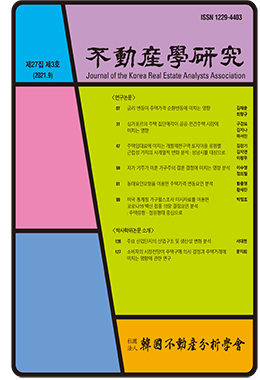본 연구는 주택의 특성과 코로나19 백신 접종 의향의 관계를 분석하는데 목적이 있다. 본 연구의 자료인 가구 펄스조사(Household Pulse Survey)는 코로나19 팬데믹 시작부터 지금까지 미국 통계청에서 전국에 걸쳐 격주 간격으로 진행 중인 근실시간(Near Real-time) 설문조사이다. 본 연구는 가구펄스조사 미시자료와 주(State) 단위 지역자료를 결합하여 1 단계 개인·가구 수준과 2단계 지역 수준의 다층이항로짓모형을 구축하였다. 분석 결과, 다양한 인구학적·사회경제적·의료보건적 특성을 통제했음에도 불구하고 주택유형과 주택점유형태가 모두 코로나19 백신 불신과 유의미한 관계를 가지는 것으로 나타났다. 특히, 이 같은 주택 특성 효과는 특정 집단과 특정 코로나19 팬데믹 여건 하에서 백신 불신을 더욱 강화시키는 것으로 도출되었다. 본 연구 결과의 함의는 코로나19 백신접종을 확대하고 백신 불신을 완화하는데 있어 개개인이 거주하는 주택의 특성이 중요한 역할을 할 수 있음을 시사한다. 아울러 코로나19 백신접종 교육과 캠페인 추진 시 코로나19 팬데믹 여건이 더욱 심화되고 있는 지역과 특정 집단에 이들 정책적 노력이 집중되어야할 필요가 있음을 뜻한다.
This paper examines the relationship between housing characteristics and COVID-19 vaccine hesitancy by using the Household Pulse Survey, a national and near real-time data timely deployed by the U.S. Census Bureau. Controlling for the individual-level and state-level characteristics in addition to spatiotemporal effects, this paper finds that overall, renters are more hesitant than homeowners about receiving COVID-19 vaccines. Multifamily residents who often contact other residents are less hesitant than single-family residents about COVID-19 vaccinations. However, these housing effects are unequal among different demographic, socioeconomic, and medical groups and depending on regional COVID-19 conditions. For instance, findings demonstrate that renters are more likely to be hesitant about COVID-19 vaccines than homeowners when they are non-Hispanic black, low-income, and non-COVID-19 patients. Multifamily residents appear to be less hesitant about vaccinations when they reside in the region featured by rapidly increasing COVID-19 cases and expanding vaccine rollouts. These results suggest that it is critical to recognize the significant role of housing characteristics in determining individuals’ vaccine hesitancy. Vaccine programs and interventions should target those who report a higher level of vaccine hesitancy when living in specific housing conditions and regional contexts during the pandemic.




